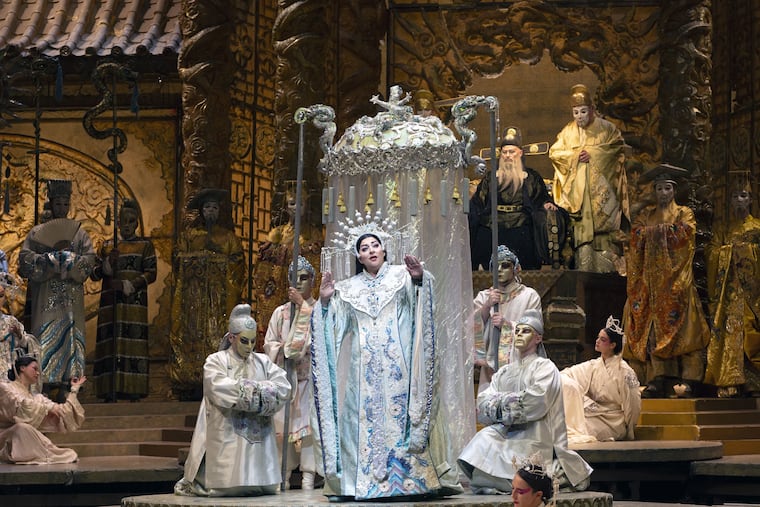It’s peak Yannick on classical stages: Met Opera one night, Philadelphia Orchestra the next
The busy, busy maestro conducts back-to-back shows in New York and Philadelphia.

Since teleporting isn’t yet perfected, Yannick Nézet-Séguin is having a conventionally hectic October that began on Thursday with Puccini’s Turandot at the Metropolitan Opera and continued Friday with the Philadelphia Orchestra’s Rachmaninoff/Strauss program — one that will be partly reprised for the opening of his season-long Carnegie Hall “Perspectives” series on Oct. 15.
It is all possible logistically. And all went quite well so far. But even though his programming choices were effective crowd-pleasers, success was by no means assured.
It’s a fair guess that Nézet-Séguin was itching to have his turn at the super-ornate 1987 Franco Zeffirelli production that is among the Met’s most famous.
This Chinese fairy tale about an ice princess who executes her failed suitors has lots of everything — big chorus and orchestra, acres of scenery, steep vocal demands — which means opening nights can be a tad rough. In the title role, stentorian Christine Goerke was reasonably imperious, though her usual theatrical veracity didn’t kick in until her Act III transformation.
As Calaf the conquering Prince, Yusif Eyvazov summoned vocal thrills for his “Nessun Dorma” aria — thanks to Nézet-Séguin bringing the orchestra down to a hush — but elsewhere sounded muted and strained.
Secondary roles buoyed up the rest: Eleonora Buratto was in full command as the slave girl Liu, singing with a steely sense of vocal line but a wonderfully softened upper range, while James Morris, as the deposed king, delivered vocal solidity at age 72 plus emphatic outrage in an opera where larger, deeper meaning is hard to come by.
Nézet-Séguin’s luxuriating in the opera’s orchestration had mixed blessings: You want the piece to keep moving so that the audience doesn’t have time to think about the opera’s means of manipulation. Yet he found darker, more dissonant undercurrents — imagine psychopathic Ravel — where other conductors are happy with sonic spectacle.
Most remarkable was the ending. Puccini left the opera unfinished (some say abandoned because he was so stymied by the happy ending). But the often unconvincing (and trimmed) Franco Alfano-composed conclusion maintained dramatic tension on Thursday and seemed just long enough.
Back in Philadelphia, Strauss’ ultimate special-occasion piece, An Alpine Symphony, arrived with the Kimmel Center stage stuffed in a wind machine, thunder sheet, and much percussion. Hearing all of that — plus organ — with a master orchestrator like Strauss has thrills that will also be much appreciated in Carnegie Hall.
But this unbroken, 50-minute span of music about alpine climbing was written by the composer at a time when he had outgrown the graphic musical descriptions of his earlier life, summoning mostly second-drawer musical ideas and achieving the depth of a postcard.
Mahler’s nature symphonies suggest that he had truly listened to the earth. Strauss just watched. He delivers a few birds and yodels but certainly no mud or sunburn. But the Philadelphia Orchestra certainly went to town on it — a reminder that one should hear An Alpine Symphony occasionally.
What Carnegie Hall won’t hear is Haochen Zhang — who was a Gary Graffman student at the Curtis Institute — playing the Rachmaninoff Piano Concerto No. 2 in a performance that set standards in its synergistic sense of ensemble.
The much-idolized Daniil Trifonov has memorably recorded the concerto in Philadelphia, but Zhang was an alternate experience. Zhang probed the work — and his personal responses to it — at every turn with a Chopin-esque detail and sensitivity.
The give and take between him, Nézet-Séguin and the orchestra was beyond anything I’ve heard in this piece, creating a flowing ocean of music. Though Zhang’s command of the keyboard allows him to hit all of the necessary peaks, he’s more remarkable for projecting heroic intimacy. He also knows how to create tension with silence.
Just for the record, his encore was the Chinese folk song “Liuyang River” played in honor of Ambassador Huang Ping, consul general of the People’s Republic of China in New York, who was in attendance.
Yannick Nézet-Séguin will conduct Turandot Oct. 9, 12, 19 and 26 at the Metropolitan Opera, Lincoln Center, New York. Tickets: $37-460. The Oct. 12 performance will be seen in a live, HD simulcast to movie theaters throughout the Philadelphia area. Information: 212-362-6000 or www.metopera.org.